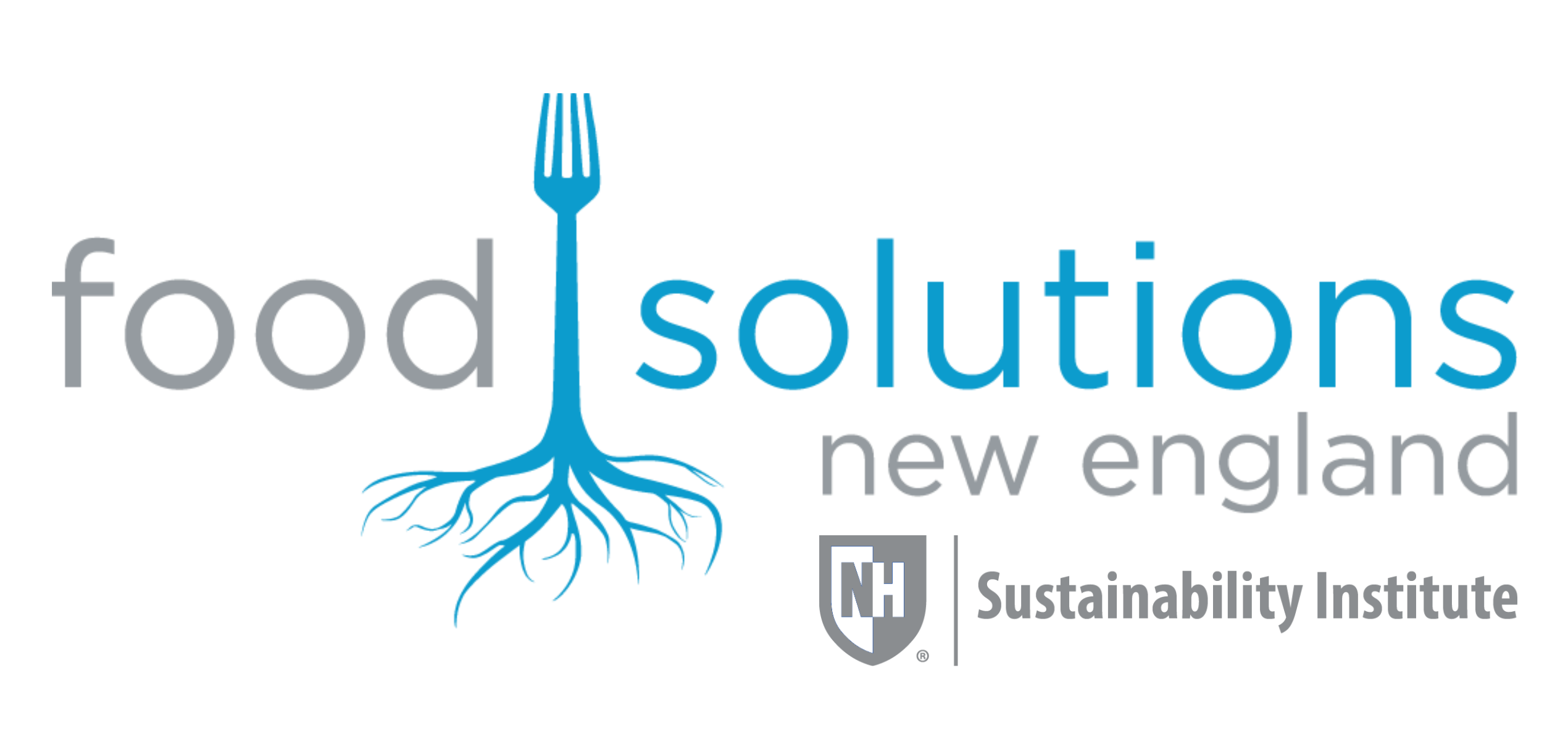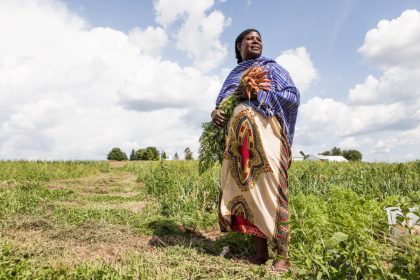
This post by Lesley Heiser was originally published by The Rumpus on March 6, 2017 as part of TORCH, their series devoted to showcasing personal essays and interviews about immigrant and refugee experiences. Featuring the work of diverse writers from around the globe, TORCH aims to shatter stereotypes and encourage greater understanding and empathy in a world where immigrant and refugee communities are often misunderstood and marginalized.
High Tunnel
Hussein Muktar hammers a wooden rib around the insides of one of four adjacent high tunnels, also known as hoop houses. The long, arced light metal structures used to extend farmers’ growing seasons are supposed to be covered in plastic.
But it is spring 2016 in central Maine and the winds are high and, for the second time this month, the roofs of three of the tunnels have blown off. Hussein works in the one that’s most ripped apart—its transparent plastic flapping wildly in large wings. To go inside it is to be immersed in sound, like being in the hull of a sailing ship.
Yet it is also to feel soothed. Despite the damage, the inside’s still warm and smells of the earth where neat beds of spinach, carrots, and arugula grow. The ends of the hoop house are beautiful, the shapes of domes.
This structure belongs to Hussein’s mother, Seynab Ali, one of the most experienced refugee farmers in Maine. Seynab taught her son animal husbandry and vegetable production from the age of five in the Somali hinterland.
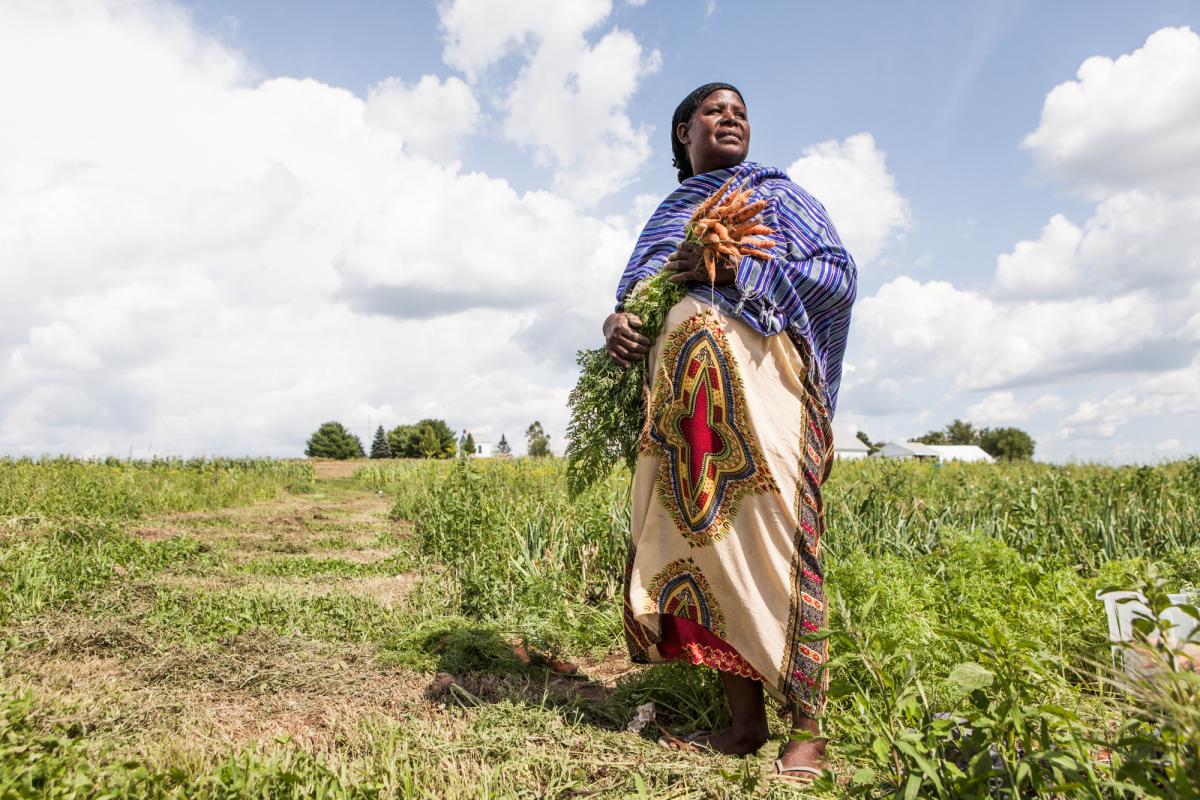
Many years later, this pair farm together here at Packard Littlefield Farm in Lisbon Falls, six miles outside Lewiston, Maine’s second largest city.
Beads of moisture drop from remaining parts of Seynab’s rounded roof. Her seedlings are bordered by plastic pipes. “Because of the tunnels, we’ll get to market by mid-May instead of in late June,” Hussein tells me. “We can harvest all the way through November. We’ll make more money.”
Sometimes Hussein sounds like he’s all business; sometimes he does not. What he likes best about farming, he says, is being out at the farm with his children. What he likes second best is the knowledge that the food they eat is safe.
“If I go to Walmart and buy a tomato, I have no idea where it comes from. If I grow a tomato myself, I can cut the stem and eat it right in the field.”
It’s a life that’s possible in Maine. He smiles as he talks about living here. “You see people that you know, children you know. You see your friends and family often.” It’s not that different, he says, from “life in the village I was born in.”
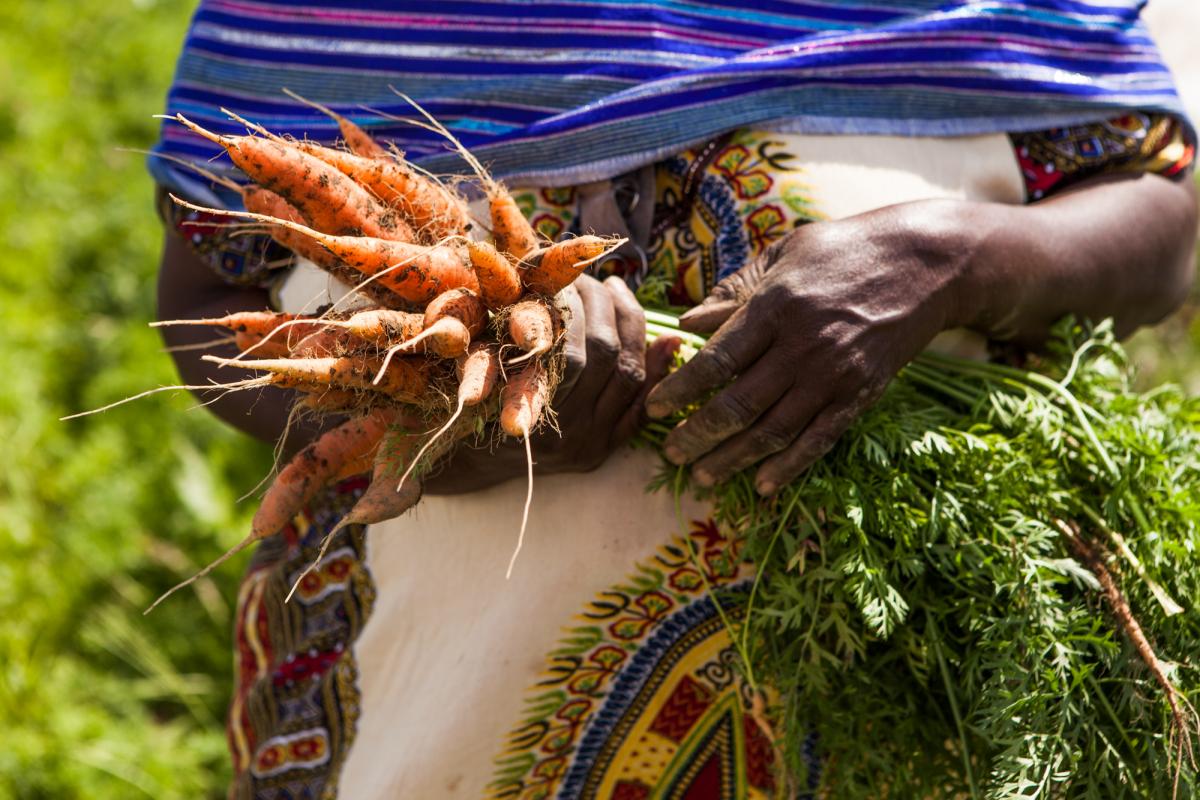
We walk outside. Suddenly, it’s cold. Dark beds bear stumps of the corn that many of the refugee farming families in Maine love to plant, tend, and harvest. The US is overloaded with corn, but, here, tall green cornstalks on a blue summer day represent hope. They represent sufficiency. They evoke delight and deliciousness and a solid future.
Packard-Littlefield Farm
Packard-Littlefield Farm leases just thirty acres to Cultivating Community, a Maine nonprofit and also my employer, which runs the New American Sustainable Agriculture Project, collaborating with sixty farming families in 2016. On small parcels of land, farmers and gardeners from several countries gain access to the soil, adapt their growing skills to the Northern New England terrain and climate, and, in many cases, build successful farm businesses.
They do it without synthetic pesticides, herbicides, or fungicides. They sell to CSA customers, farm stands, restaurants, and businesses and provide discounted food to pantries and soup kitchens.
Across the street on the other side of the farm, two women chat in another high tunnel that’s full of shelving stacked with trays of green seedlings.
From what I know, these farmers don’t speak much English, and, of course, I don’t speak their language, either. We offer greetings in our own way and smile at each other as the sun beats down through the thick plastic sheeting.
The scent of the earth in the trays rises up. In a new suffusion of light, the seedlings are bright as emeralds.
Lisbon Street and John Yanga’s Field
A few days later I walk with Grace Manzul down Lisbon Street, the city of Lewiston’s main thoroughfare.
Grace is twenty-three. Her mother is Ethiopian and her father Sudanese. Her family gained political asylum and moved to the US when she was a little girl.
Now she works as one of two urban farmers hired to run the rapidly expanding community gardens program in Maine’s most populous city, Portland, an hour away. She’ll help care for a dozen garden sites, more than 600 gardeners and volunteers, school gardens, orchards, and bees.
She’ll be in charge of growing. She’ll steward the soil and nurture it.
Grace is part food grower, part passionate healthy food lover, part young professional, part advocate for young women of color, and part urban hipster, and of course that’s not all.
A tall, striking figure with long thin braids, she wears an urban uniform of slim pants and a long denim coat. She mentions her sandals are Italian.
It’s a mild day, but the blue sky’s patchy with dark clouds. “It’s Maine,” we laugh. Any warmth is ephemeral.
We jaywalk back and forth across downtown Lewiston’s slow traffic, searching out pools of sun along the storefronts—halal markets, African clothing markets, specialty grocery stories that also function as travel agents and provide ways for people to send money home, and small restaurants. We enter one of these. A kind man all in white tells us we can have goat if we wait fifteen minutes. Grace doesn’t want to wait.
We pass many more establishments including an ultra-trendy local food market, an Indian restaurant, bars, and, next to them, a mosque. With its windows covered with blinds and lack of signage, the center is anonymous except for a flyer in the glass graced with Arabic script, which also advises in English, “Always forbid evil and enjoin good.”
I met Grace’s father, Patrick, several years ago when he walked into Cultivating Community’s office in Portland’s biggest housing project and complained about poor water access in the nearby urban farm where he had a plot.
He said he wasn’t satisfied with his plot, that he wanted a bigger one.
He said what he really wanted was to farm in Africa right now.
According to Grace, her father still suffers from PTSD, an effect of his experiences in Sudan’s long and continuing civil war. He won political asylum and brought his family to the US in the early 1990s. An urbane and sensitive man, he worked in food processing factories in Portland where, his daughter explained, he encountered a great deal of racism.
Now Patrick is gone. This very month, in April 2016, he left Portland and his family to start again in his home country.
Grace and I jump in our car and head out of Lewiston and over to Packard Littlefield Farm. She’s anxious to see this more rural growing site before she gets embroiled in the growing season in the city. At the high tunnels, we find one of the farmers whose plastic sheeting had blown off, and he’s inside his structure with two young people. One comes over and says that the farmer is taking his tunnel down; he’s starting all over.
We duck out politely and look across many fields. In the distance, a man in a tractor tills his soil. We decide to go over and tromp across the messy wet earth.
A bird flies out of a little pool in patchy grass. The clouds have grown heavier and grayer and now the day’s enshrouded in an almost smoky mist.
Despite her strappy sandals, Grace navigates the field without error.
When we get closer to the farmer, it’s John Yanga, a farmer from Sudan. Suddenly Grace is greeting someone in John’s high tunnel, and I go in and it’s his wife, Rebekkah. Grace and Rebekkah know each other in Portland, where they all live, and it seems there is much to talk about in their own language. Then, we’re all back outside and John is hopping off his tractor and rushing up to Grace to ask how she is.
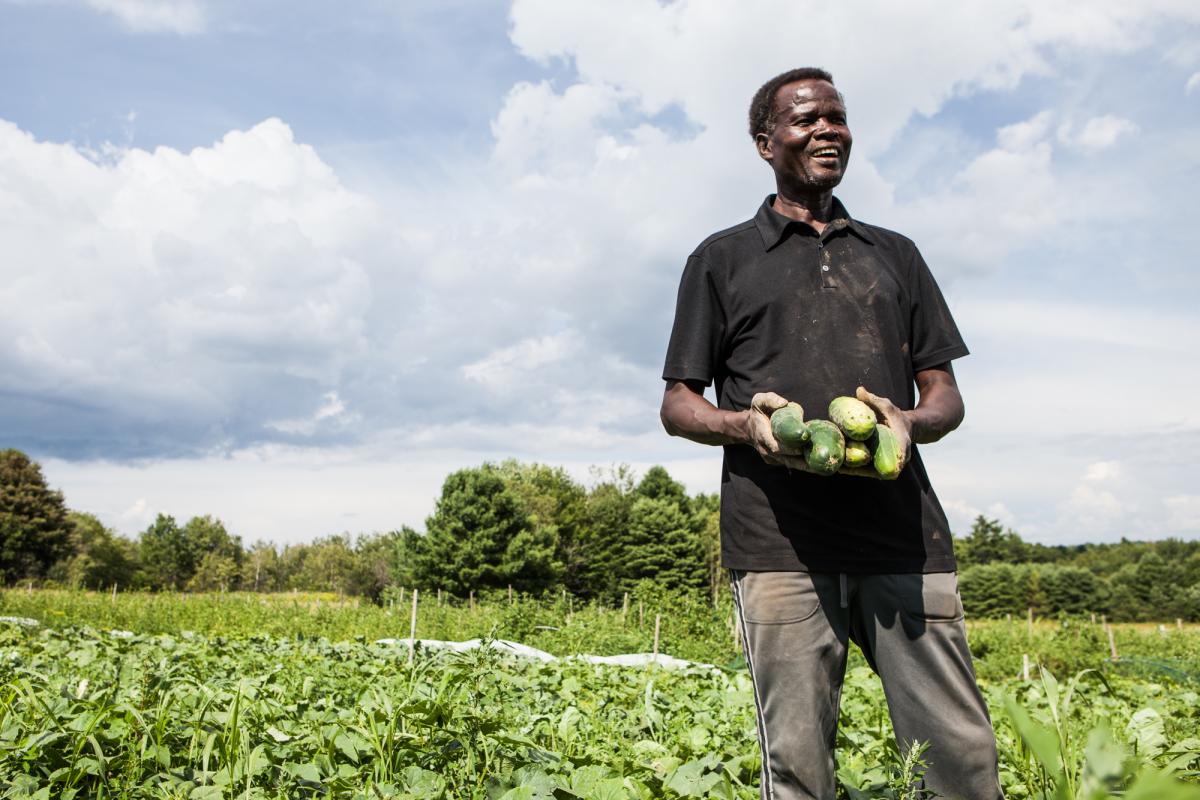
It occurs to me that Grace’s father is surely good friends with Rebekkah and John, but he isn’t here anymore. Grace had said that when her father started growing food in Portland “it was like going home.” But yet it wasn’t enough.
John is a tall man with a muscular frame. He looks like the most capable farmer you could ever imagine. He greets me and points at a huge pile of garlic, which he’s used to feed his soil.
“This soil used to be very poor,” he says. “I’ve had to put a lot of nutrients in it. Over the years it’s started to produce very well.”
He works part-time in Portland for a business that manufactures auto parts but he’s thinking of moving to Lewiston and farming full-time.
“I’m waiting for my kids to be out of high school.”
He looks over his dark, newly turned earth. He says proudly, “I’ve been farming here since 2006.”
Later, on our drive back to the Cultivating Community offices Grace talks about her family, her sense of community, and farming.
“When I was little, I used to ask my sister who I was,” she says. “It was kind of tough for me because I wasn’t outgoing when I was younger. I was quiet, a homebody. I would stay at home and read books. It was hard to be Ethiopian and Sudanese. You’re not from here or there, never fully from anywhere. You’re not white. I felt so weird and alone.
“But last summer I worked on a farm, and I felt the connection with food and I loved growing. I loved walking up the hill to pick some lettuce, pick a cucumber. To pick a tomato and make food. I felt the connection to food and the earth, and it healed me.’”
Grace adds that she’d love to live in the country, she’d love to farm. “But I don’t think I’d be safe in rural white American communities.”
In the United States, black food growers have always lived in a state of flux, connected to the land and the life and the potential prosperity that they can yield, but vulnerable to discrimination and terror.
These days, there are 350 mostly small and diversified farms in the single county where Hussein Muktar and John Yanga farm. They provide fruits and vegetables, maple syrup, honey, meat, dairy, and other animal products.
Half the state’s farmer population is over sixty, and over the next decade 250,000 acres of Maine farmland will change hands as farmers die. To ensure that agricultural land will not just be sold as real estate, it’s estimated that 200 new food producers must begin farming annually. The influx of farmers from Africa has not only enriched Maine’s local food economy and communities, but has also helped staunch and reverse the bleeding of farmers in the state.
Kennedy Park Farmers’ Market
It’s a hot day in July. There’s an unrelenting drought across the Northeast. Yet farmers farm. They don’t need reason or permission.
Hussein has spent the morning helping different growers with improvised irrigation so they don’t lose everything they have or their dreams for the future.
At the farm, the fields are producing. Vegetables are getting harvested and rinsed in the wash-and-pack station and prepared for market. They’re heading out of Packard-Littlefield Farm every day. They’re going into CSA shares for more than 300 customers, going to food pantries, going to businesses, going to markets, going to restaurants.
Later I meet Hussein at downtown Lewiston’s Kennedy Park Farmer’s Market, a weekly market under a canopy of trees. In this summer of drought, I want his perspective on the season.
The tables of squash, beans, potatoes, peppers, tomatoes, and all manner of leafy greens under the lush summer branches that the farmers, all women, tend is gorgeous, evoking some kind of paradise.
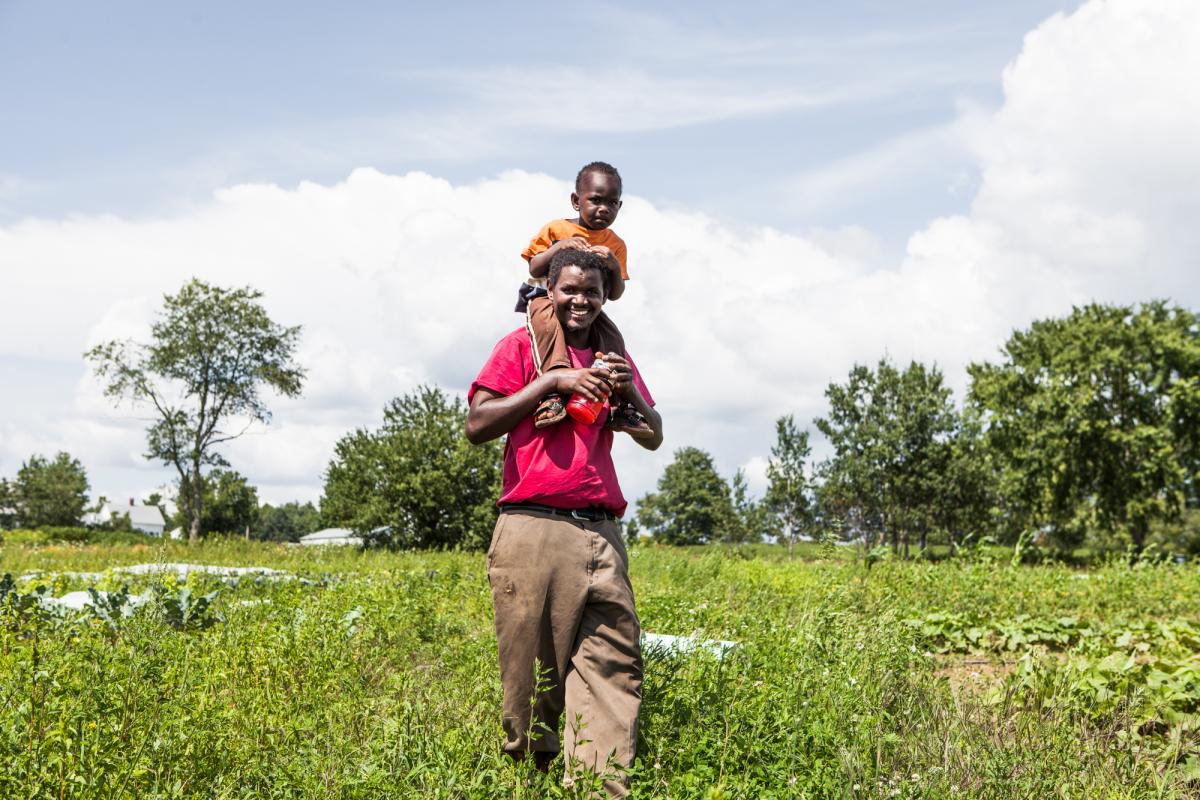
He’s stretched out on the grass. Farmers’ children crowd around him. “It’s hard work right now,” he says. “It’s really hot. The problem is water—there’s not enough and we’re struggling.” The farmers are piping it in from a nearby river and covering some of the crops with hay so they’ll retain moisture, he says.
He gets up and grabs a carrot from a table. He sits back down, and a child on the grass watches him eat as she nibbles a cookie.
I ask Hussein if he’s proud of the work he’s doing. He says that he is.
We stop talking. For a moment, the market feels like peace.
Point of Arrival
Donald Trump arrives in Maine a few days later. With Paul LePage at his side he aggressively slanders Maine’s Somali immigrants, accusing them of “many, many crimes getting worse all the time.”
“It is damaging to the psyche of our youth to hear a major party presidential nominee insult our culture and religion, especially while standing next to the governor of our state,” the Somali Community Center of Maine responds. “We condemn his name calling, scapegoating, and the lies perpetrated by his campaign.”
Crime has fallen significantly in Lewiston, Portland, and Maine since significant numbers of people from Africa began relocating here, dropping 23% in Lewiston from 2005 to 2014.
Refugees from dangerous places should no longer be admitted to the US, the presidential candidate loudly opined on his August visit to Maine.
But in late January of 2017, when the new president attempted to move in this direction, 2,000 protestors from diverse backgrounds surged into Portland’s international airport.
We gathered in baggage claim and held signs with passionate messages. Police officers with a large husky chatted and hung back. The mayor of Portland addressed the crowd, stating to the immigrants present, “You are our future.” We stood in a moving silence, and then we did not.
Lesley Heiser has published in Boulevard, Puerto del Sol, Ms., and the Baltimore Sun. She’s on staff at the food-based nonprofit Cultivating Community and is a member of the Network Leadership Institute of Food Solutions New England.
Photographs © Greta Rybus.
